Guatemalans Accused of Bribing and Surrounding BDF Soldiers at Machakilha
BDF told to Stand Their Ground as “Hostile” Guatemalans Surround Them
On September 7, a group of Belize Defence Force soldiers found themselves surrounded by more than 10 possibly armed and hostile Guatemalans near Machakilha Conservation Post (CP). The last order that the patrol at the CP received from Fairweather Camp before communication was lost was “man your grounds.”
News 5 Digital has obtained a copy of the “Machakilha Patrol Report.”
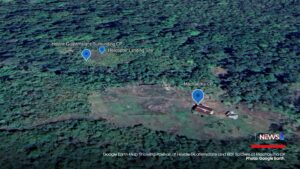
Soldiers reportedly became on edge after realising that they were being surrounded by possibly armed and hostile Guatemalans that had gathered near the helicopter landing site. Their intent, it is believed, was to retrieve the 5 Guatemalan men who were caught conducting illegal logging activities in the Columbia River Forest Reserve.
The sun had begun to set. Communication with Fairweather Camp in Punta Gorda Town had been lost. It is believed that the BDF soldiers were outnumbered and outgunned.
At around 6:30 p.m., soldiers heard 2 gunshots from a distance.
The patrol commander made the “tactical decision” to release the 5 detainees along with 2 of the 4 chainsaws to “de-escalate the situation, providing a win for both parties involved.” The decision was also made to prevent the loss of lives on both sides.
Due to the change in circumstances, the original mission, which was to destroy two wooden bridges that were illegally built by Guat emalans in the Columbia River Forest Reserve, was abandoned.
On September 28, we tracked down the Minister of National Defence and Border Security, Florencio Marin Jr., at a People’s United Party event in Belize City. We asked him about the incident. He said, “Yes, I’m aware. And I think if you notice that every time our soldiers encounter these things; they take the appropriate action to discourage them, to remove the Guatemalans, whatever it is, but to be able to stop it, you know.”
Guatemalans Caught Illegally Logging in Belize, Again
A BDF patrol departed en route to Machakilha Conservation Post (CP) on September 6. Their mission was to destroy two wooden bridges that had been built by Guatemalans in the same area in the Columbia River Forest Reserve where the previous bridges had been built.
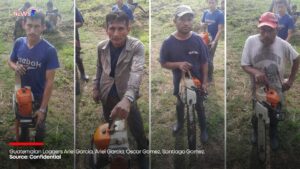
The following day on September 7, the patrol, after an arduous 18-hour trek through the dense jungle, stumbled upon the scene of an illicit timber activity. At around 1 p.m., near the Machakilha Conservation Post, soldiers heard the unmistakable buzz of chainsaws. Their instincts were right—illegal Guatemalan loggers were hard at work. With precision, they closed in on 56-year-old Santiago Gomez and his 17-year-old son, both caught red-handed with piles of valuable timber some 600 meters in Belize. The logs were ready for transport. None could provide an official form of identification. The older Gomez was informed that they are being recorded to protect their human rights and that a search will be conducted for weapons and ammunition. None were found.
But that was just the beginning.

As the patrol pressed on, they intercepted a Guatemalan family in a modified Toyota 4×4 truck—rigged for smuggling logs across the border. The family was intercepted in a “truck-o-pass,” a term used by Guatemalans for the illegally built roads. It basically means where the trucks can pass. The family consisted of 36-year-old Juan Jose Garcia, his wife, 29-year-old Lydia Ramirez, and their two children, ages 4 and 12. Again, they could not produce any official form of identification. They were relocated to the rally point.
The family was part of a larger group involved in this lucrative but illegal operation. Not far away, more Guatemalans were arrested and detained. They were chainsaw operators: 47-year-old Emilio Chun, 29-year-old Oscar Gomez, the son of Santiago Gomez (the first chainsaw operator), and 24-year-old Ariel Garcia.
None of the detainees showed signs of resistance. Juan Jose Garcia was suspected to be the “Boss” on the ground, but the real mastermind—known only as “Salvador”—remains elusive.
During the search, only Ariel Garcia, Santiago Gomez, and Emilio Chun admitted they knew they were in Belize. Chun, speaking in Spanish, said he wasn’t doing anything wrong, explaining that he is poor with no job, land, or resources.
The patrol commander decided to release Lydia Ramirez and her two children. Santiago Gomez gave permission for his son to return with Ramirez. They were escorted to the border.
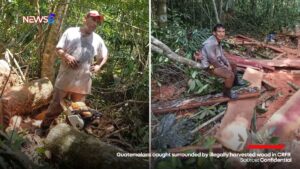
The five Guatemalan men, including the chainsaw operators and the vehicle driver, who was identified as the “Boss” of the group, were escorted to the CP.
For five years, these loggers have operated fearlessly within Belizean territory, harvesting prized woods like rosewood under Salvador’s command. The groups typically consist of a driver who is regarded as the boss on the ground and 4 to 5 chainsaw operators. It is believed that “Salvador” has more groups illegally operating near the CP.
It is also believed that they are from Las Lajas, a historic town situated in the central-western region of Neuquén Province, within the Department of Picunches. It is one of the oldest towns in the province, with a population of about 4,964 residents, according to the 2010 population census.
Chief of Staff for the B.D.F., Major Roberta Usher, confirmed that the Guatemalans were detained in Belize. She said, “We can confirm that the legal infrastructure, including the bridges, was identified within Belize, and in response, the proper protocols aligned with the confidence-building measures to ensure appropriate actions were taken.”
“Échame La Mano”
When the group of detained Guatemalans were being escorted to the CP, a conversation with leader Juan Jose Garcia was initiated by the patrol commander. During that conversation, Garcia tells him, “Échame la mano.” This means “Help me out.”
News Five Digital has obtained a signed report of the allegation (according to the soldier’s version of events) and a portion of an audio recording of the conversation. The word bribe is not heard in any language.
According to the document, Jose Juan Garcia allegedly attempted to bribe the soldier, who refused multiple attempts. He informed Garcia that he would follow all protocols. During the conversation, Garica disclosed details about the illegal logging operation, which included four sub-bosses working for Salvador. But the real bombshell? According to the report, Garcia confessed to bribing commanders at the CP to continue his illegal activities. He even provided descriptions of those involved.
The report states, “Jose Juan Garcia made mention that he has been operating within the AO (area of operation) for almost 5 years and that he has bribed most of the commanders at the CP. He gave a brief description of the commanders who he had lately bribed and had mentioned… He described an African-descent individual who accepted his bribe and one that did not. He also mentioned about one Spanish-descent commander who was recently at that location and did not accept his bribe.”
The CP commander and the patrol commander are two different individuals.
The patrol commander made the decision to release the detainees. Officially, he is being accused of failing to carry out his duties by not destroying the bridges. Unofficially, he is being accused of taking a bribe. The patrol commander and his team were searched. No money or illegal items were found on their person.
When asked about the bribery allegations, Minister Marin seemed caught off guard. “This is the first I’m hearing of this,” he said, adding that any illegal structures are usually taken down immediately unless the Organization of American States is involved.
If the allegations of bribery are true, it would point to deep-rooted corruption on the ground that allows Guatemalans to operate freely on Belizean soil. Major Usher says they are investigating.
Outdated Communication Equipment?
The September 7 confrontation at Machakilha was compounded by a reported radio malfunction.
The Belize Defence Force uses Harris and VHF radio for communication. The Harris radio, made by L3Harris Technologies, is a secure, rugged communication device used by military and emergency services. It offers encryption, long-range, multi-frequency, and GPS for critical operations. The VHF radio is a powerful and versatile communication device, designed for use in a variety of professional settings. However, on the day of the incident, communication using both radios failed. Communication could not be established on the VHF radio, and the Harris radio eventually “went out of sync.”
The BDF’s Fairweather Camp in Punta Gorda Town was informed that the CP was being surrounded by “potentially hostile” Guatemalans, seemingly intent on retrieving the detained men. The response from Fairweather was “man your grounds.” Communication then failed as the Harris radio lost sync, leaving the patrol without communication. Attempts to restore contact failed.
Another attempt to report the situation via the Harris radio at 9:30 p.m. was unsuccessful, and the patrol harboured for the night, departing the next morning.
We asked Minister Marin if the BDF’s communication equipment is out of date and in need of replacing.
Continued Incursions by Brazen Guatemalans
Belize’s border with Guatemala is porous. This makes it impossible for Belize authorities to guard and monitor the border for continuous periods. Not to mention the lack of resources to do so. Guatemalans, especially those living near the border, know this. They also know that Belize Defence Force soldiers conduct routine patrols in the area with the aim to prevent and stop incursions.
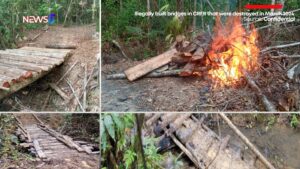
In recent years, there has been an increase in reported incursions by Guatemalan peasants. They’ve gotten bolder. They’ve crept deeper into Belize. In March 2024, the BDF destroyed two wooden bridges constructed by Guatemalans inside the Columbia River Forest Reserve. These bridges were being used to facilitate illegal logging activities. The discovery of the bridges was made in late February. Friends for Conservation and Development (FCD) brought the matter to public attention, saying that Guatemalans had also carved a road through the reserve. This road stretched some two kilometres into Belize. The bridges allowed trucks to access the area for timber extraction, likely involving valuable woods such as rosewood. Aerial surveillance revealed ongoing human activity, with visible timber stacks in the area. Back then, Deputy Commander of the B.D.F., Colonel Anthony Velasquez, told News Five, “We have increased active military presence in the area over this period to ensure that they do not return and continue their legal activities.”
That same month, another illegally built road stretching more than a kilometre into Belize was discovered. This time in the Chiquibul Forest. It was also built by Guatemalans. This road was being used by Guatemalan ranchers to access water for their cattle roaming Belize’s forest. The road, which originates from the Guatemalan side of the border, is believed to have been commissioned by wealthy cattle ranchers. Executive Director for FCD Rafael Manzanero said, “So we see that with heavy machinery, of course, those are more investments, and these are not really done by poor people along the adjacency zone, but more than likely, we believe they are by cattle ranchers in terms of trying to find an area where to get water.” In a separate interview with News Five, Col. Velasquez said, “It’s a road that was cleared by heavy machinery, so it’s a pretty open road.” Col. Velasquez added that patrols were sent to the area to closely monitor any movements and to detain anyone found there.
Raping Belize’s Resources
The Columbia River Forest Reserve is one of the most species-diverse areas in Belize. Previously managed mainly for timber extraction, the reserve is now recognised as a vital component of Belize’s National Protected Areas System. It serves as a crucial ecological haven that faces increasing threats from illegal logging, primarily by individuals crossing the border from Guatemala. This illegal activity not only disrupts ecosystems, endangers wildlife, and contributes to environmental degradation through habitat loss and soil erosion but also threatens the livelihoods of local communities that rely on the forest for sustainable living. The Belize Territorial Volunteers (BTV) have raised alarms after discovering significant illegal timber extraction, urging the Belizean government to increase patrols and collaborate with Guatemalan authorities to address the issue.
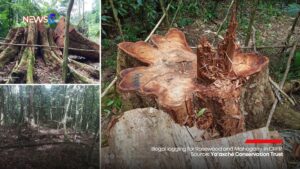
We also caught up with Orlando Habet, Minister of Sustainable Development. The Forest Department which manages the Columbia River Forest Reserve, falls under his ministry. According to Minister Habet, a flyover of the reserve showed multiple clearings.
Written by Digital Editor, Hipolito Novelo.





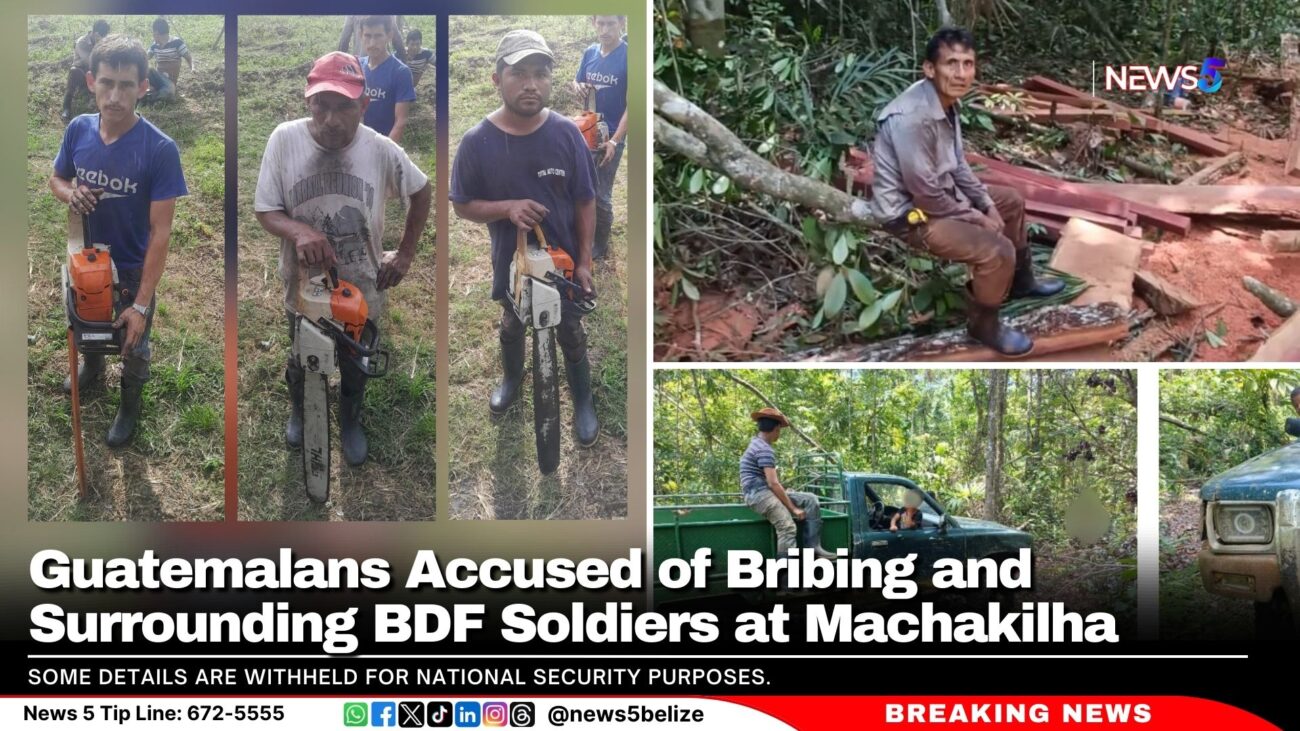

Facebook Comments